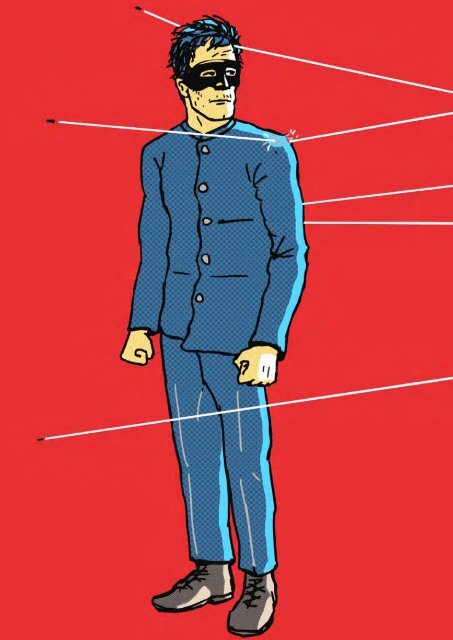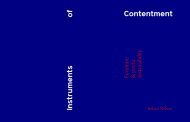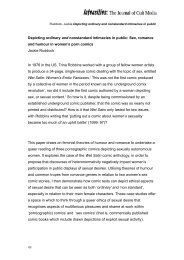AN AUSTRALIAN SUPERMAN
islandsuperman
islandsuperman
You also want an ePaper? Increase the reach of your titles
YUMPU automatically turns print PDFs into web optimized ePapers that Google loves.
<strong>AN</strong> AUSTRALI<strong>AN</strong><br />
SUPERM<strong>AN</strong><br />
PHILOSOPHER DAMON YOUNG PONDERS THE QUESTION:<br />
WHAT IF BABY SUPERM<strong>AN</strong> HAD L<strong>AN</strong>DED IN THE AUSTRALI<strong>AN</strong><br />
OUTBACK INSTEAD OF MIDWEST AMERICA?<br />
Man is certainly stark mad; he cannot make a worm, and yet he will be making gods by dozens.<br />
– Michel de Montaigne, Essays, 1580.<br />
GODS <strong>AN</strong>D GOLEMS<br />
But first: who is Superman? A New World god, raised in<br />
a small country town. And if not a god, then a monster:<br />
like a golem, only his mud is from midwest cornfields,<br />
not the Vltava.<br />
The Hebrew echoes are no coincidence. Invented by<br />
Jewish Americans in the thirties, Superman was himself<br />
a refugee. (And drawn after a Jewish model from New<br />
York, Stanley Weiss.) Nowadays he is seen as the quintessence<br />
of America, but only insofar as the modern<br />
United States is a country of immigrants. Like many<br />
of his fellow superheroes from both major studios – the<br />
X-Men, Spiderman, the Hulk, Batman – the Man of<br />
Steel was an outsider, first written by Jews who were never<br />
quite at home in the countries their heroes defended. As<br />
Michael Chabon makes clear in his novel, The Amazing<br />
Adventures of Kavalier & Clay (HarperPerennial, 2000),<br />
there’s a double wish-fulfilment here. Alongside the<br />
pogrom fantasy of raw power comes a vision of nobility:<br />
conquering one’s adopted nation with virtues.<br />
With the early superheroes, it is important not to<br />
push the philosophical reflections too far. ‘Superman’,<br />
for example, had no suggestion of the Nietzschean<br />
über-mensch. ‘Super’ was slang, like ‘awesome’ is today –<br />
the language of pulp magazines, a market available to<br />
immigrants with little social and cultural capital. Joel<br />
Siegel, who first wrote Superman, was not Frank Miller<br />
or Alan Moore. The point is not that Action Comics had<br />
no dramatic virtues, but that these stories were chiefly<br />
for entertainment. They were righteous escapism. By<br />
April 1942, Time reported that Superman comics were<br />
‘among essential supplies’ for American troops at Midway.<br />
A golem for the goyim.<br />
RED SON<br />
Like his fellow monsters and gods, Superman outlived his<br />
parents. In the last 80 years, the alien named Kal-El has<br />
been continually written and rewritten. As Ben Saunders<br />
points out in Do the Gods Wear Capes? (Continuum, 2011),<br />
Superman has been the voice of socialism, capitalism,<br />
solipsistic escapism and sophisticated doubt. He is the<br />
‘Good’, however simply or sophisticatedly this is dreamt.<br />
In some of the more thoughtful stories, the pissed-off<br />
golem and corn-fed naïf combine suggestively. In Mark<br />
Millar’s Superman: Red Son (DC Comics, 2003), for example,<br />
the Man of Steel becomes the Man of Stalin (‘Steel’<br />
in Russian), landing in a Soviet farm instead of America.<br />
After Stalin’s death, Superman becomes the leader of the<br />
USSR, and much of the planet. (The United States opts<br />
out, preferring ‘free’ anarchy to oppressive peace.) ‘Almost<br />
six billion citizens, and hardly anyone complained,’<br />
Superman remembers, before adding unsettlingly: ‘Even<br />
in private.’ Powerful, idealistic, and politically simplistic,<br />
Superman is a benign tyrant, and the United States, led<br />
by Luthor, is maniacal about stopping him.<br />
It is a deft riff on Cold War morality, as well as a crude<br />
but crisp warning about power and the belief in one’s simple<br />
righteousness. ‘All I had to do,’ reminisces Superman,<br />
‘was bide my time and the whole world would finally be as<br />
perfect as god had intended it to be.’ Red Son also portrays<br />
how petty egotism and liberty can work together: Luthor<br />
is rightly against Superman’s tyranny, but he is also jealous<br />
of the Soviet’s genius and strength. The USSR and USA<br />
go to war, driven partly by their leaders’ flaws: naive, noble<br />
Superman and worldly, cunning Luthor.<br />
For all the narrative shenanigans, the message of Red<br />
Son is recognisably utopian. In the end, Luthor and<br />
Superman work together. Superman retires, Luthor<br />
takes over the world, and a new age of peace, technological<br />
progress and wealth develops. Aeons on, Earth’s sun<br />
starts to die. The planet itself is collapsing into its star.<br />
Lex Luthor’s great-grandson ‘to the power of fifty’ sends<br />
his only infant son back in time, to primitive Earth and<br />
its bright yellow sun. He lands in Soviet Russia, becoming<br />
Superman. And so on. Manifest destiny.<br />
In other words: the United States creates its own perfect,<br />
god-like enemy, who then reconciles with America and<br />
saves the world. (And, comrade: quite dialectically so.)<br />
The ‘red son’ is humble, but also supremely ambitious: he<br />
can save the United States from tyranny, invasion and –<br />
perhaps most characteristically – cynicism. Whether as<br />
a Moses, Christ or a messiah-to-come, Superman is a<br />
saviour: the virtuous midwest, universalised by extraordinary<br />
power.<br />
27
ISL<strong>AN</strong>D137<br />
THE AUSTRALI<strong>AN</strong><br />
‘SUPERM<strong>AN</strong>’, c.1901–41:<br />
A FICTIONAL BIOGRAPHY<br />
Matthew Kelly was discovered as a baby in the goldfields<br />
of northern Victoria, c. 1901. His Irish-born<br />
parents, John and Martha Kelly, raised him as their own.<br />
Kelly learned the value of hard work early. But perseverance<br />
was mixed with bad luck: the promised great<br />
nugget or vein never arrived. Melbourne and the gold<br />
towns were rich, but Kelly was poor. His parents lacked<br />
the capital for a farm and general store. His father John<br />
became a shearer, his mother Martha a seamstress for<br />
pastoralists. Matthew too worked on the farm. Martha<br />
Kelly described the work in a letter to Moira McRussell,<br />
her sister in Waterford: ‘hot, filthy, dull.’ Kelly grew<br />
strong, but was remembered as a wary child.<br />
Town gossips said Kelly spotted the 1911 fires before<br />
the other boys; got his family out before the station was<br />
razed, and saved several horses. Fingers were pointed but<br />
no charges were laid.<br />
The Kellys were almost starving when a teenage<br />
nationalist ten thousand miles away shot an archduke.<br />
All the boys in northeast Victoria were soon carrying<br />
rifles and ‘running headlong into lead’, as one historian<br />
put it. Kelly enlisted in 1917, and was the only survivor<br />
of his ‘ill-fated’ platoon. Martha’s diary described John at<br />
the quay, ‘red-faced and stooped, weeping for the miracle<br />
of our boy so tall and strong and quiet’. Kelly started<br />
smoking at the front, but never developed the cough, so<br />
common to his peers.<br />
For his service, the government gave Private Kelly<br />
what he described to Martha as ‘a filthy hut on dead<br />
land’. He hunted rabbit and kangaroo with his hands but<br />
the corpses soon grew rancid in the flyblown meat-safe.<br />
Then the mice plague began. In 1919 he and his family<br />
walked off the land.<br />
Penniless, the Kelly family looked for employment in<br />
Melbourne. John worked as a bookmaker, Martha again<br />
making and mending dresses, this time for bankers.<br />
John’s drinking worsened.<br />
At twenty, Kelly joined the police force. According<br />
to his diaries, his powers began to show themselves<br />
more frequently: he ran faster than any man or animal,<br />
took a blackjack to the jaw without harm. He could<br />
see, he wrote, ‘the nice folds of pale skin and patches<br />
of fur’ under the ladies’ straight-up-and-down dresses.<br />
Kelly was directing traffic on the corner of Flinders and<br />
Swanston Sts when he first used his powers in public:<br />
he was hit by a Studebaker. The car was smashed in half.<br />
Kelly arrested the driver for drunkenness: he could ‘see<br />
the alcohol in the bludger’s blood’.<br />
In court, the young driver’s defence accused Kelly of<br />
prejudice, and asked: ‘Were you, Mr Kelly, inebriated at<br />
the time of the accident? You say you were hit by Mr<br />
Luthor, but you are unharmed, while my client’s vehicle<br />
is destroyed.’ Lex Luthor was freed.<br />
Kelly continued to work in the force, but was never<br />
zealous: he spent his days arresting fellow Irish Catholics<br />
for petty crimes. His diaries reflect chronic resentment.<br />
‘The same class of bastards who ordered us over<br />
the trenches,’ he wrote in 1921, ‘now hold up my promotion’.<br />
He saved his money, and took care of his mother,<br />
widowed by alcohol earlier that year.<br />
In 1922 Kelly began punishing criminals at night. He<br />
ignored petty theft but was severe with violence. Firearms<br />
melted in criminals’ hands. Rapists were frozen<br />
where they stood. He left tips for detectives: anonymous<br />
phone calls about opium, bookmaking, insider trading<br />
– often involving Melbourne’s Protestant elite. A judge<br />
was found tied up in an illegal brothel. A politician was<br />
photographed, from above, in a dry area buying crates of<br />
cheap whisky in Camberwell. (No charges were laid, but<br />
his career as a ‘temperance’ leader was over.)<br />
In the thirties Kelly’s surviving army comrades began<br />
dying of lung cancer and emphysema: partly smoking,<br />
partly mustard gas. He wrote in his diary that he could<br />
‘now see the tar and tumours in the lungs of the cop<br />
shop secretaries’. He stopped smoking soon after.<br />
Kelly developed a reputation as a ‘fair, tough copper’.<br />
He met returned diggers who tried to recruit him into<br />
their nationalist paramilitary, who, as he wrote, ‘sing the<br />
praises of hardworking white men, without Europe’s<br />
decedance [sic].’ A handful of unionists invited him to<br />
their communist meetings. Kelly derided their talk of<br />
‘the brotherhood of all men in socialist Australia’. He<br />
rejected both as hopelessly utopian. While he was not<br />
given to philosophical speculation, Kelly believed men<br />
were too corruptible, too weak, too stupid for any political<br />
solution. ‘Hope,’ he told Archbishop Mannix after<br />
his mother’s funeral, ‘is the enemy of a good life.’<br />
After decades on the force, some of Kelly’s colleagues<br />
began to be suspicious. He was single. Lived alone.<br />
Never went to six o’clock swill with the boys. And he<br />
never aged. His diary recorded their gossip, which he<br />
overheard from miles away, while alone in the station.<br />
They called him ‘Oscar’, after Oscar Wilde: ‘a lonely<br />
queer Mick’. Kelly quit the force in 1937 and worked at<br />
the Age as a journalist. He solved crimes at night, then<br />
wrote them up for the newspaper the next morning.<br />
By the late thirties Kelly was respected by newspapermen<br />
and readers. Crime was lowered significantly.<br />
Melbourne’s standard of living rose. His diary began<br />
to record evidence on the various elicit dealings of Lex<br />
Luthor, Australia’s wealthiest banker, and prime ministerial<br />
candidate.<br />
28
DAMON YOUNG <strong>AN</strong> AUSTRALI<strong>AN</strong> SUPERM<strong>AN</strong><br />
In 1939, when Menzies declared war on Germany,<br />
Kelly was reportedly paralysed with nerves. Age journalists<br />
said he was ‘unusually quiet, even for Kelly’. Biographers<br />
speculate that he wanted to fight, but was wary of revealing<br />
his powers. Kelly’s diary on the morning he left to<br />
enlist is telling: ‘Maybe it’s time to go public? The Japs<br />
and Krauts are just men; just skin and bone. I now know<br />
I’m bloody bulletproof. I can end this war in a few days.<br />
Maybe I can save a few boys from the dirt this time.’<br />
Not long before Kelly left for the war in 1941, Lex<br />
Luthor invited him for a private meeting. It’s likely<br />
that Kelly, aware of Luthor’s criminality, warned the<br />
millionaire not to run for office. There is no written<br />
record of the conversation, but, according to maid Kitty<br />
McGuinness, Luthor reportedly gave his guest a green<br />
stone in a lead box. ‘Open this later,’ he allegedly said. ‘It<br />
will explain why I deserve to be prime minister.’ Servicemen,<br />
interviewed years later, wrote that Kelly opened the<br />
box aboard a troop carrier, grew pale and fell overboard<br />
before the ship reached North Africa.<br />
Matthew Kelly was never heard from again. His<br />
death was ruled an accident by the military authorities.<br />
He had no living relatives to request an investigation.<br />
Lex Luthor was elected prime minister of Australia, but<br />
vanished one afternoon while swimming.<br />
RED EARTH SON<br />
So, then, does an Australian Superman sound plausible?<br />
Australian superheroes certainly thrived during and<br />
just after the Second World War, when foreign titles<br />
were restricted. My father followed local characters like<br />
Captain Atom and the Lone Avenger. (He read these at<br />
friends’ homes. My English grandmother was not having<br />
that Australian ‘tripe’ in the house. For the record,<br />
my mother’s Australian-born family ate tripe.) The local<br />
comics industry then receded in the fifties as television<br />
began, censorship heightened (along with moral panic),<br />
and import restrictions were lifted. Still, for many<br />
years Captain Atom reportedly outsold Superman in the<br />
antipodes.<br />
For all the ubiquity of American fantasies, Australia<br />
was not messianic. Moments of aspiration, yes: dreams<br />
of overcoming the English class system and ‘degeneracy’<br />
of old Europe, for example. The image of tough, simple,<br />
hard-working diggers – immortalised with some ambivalence<br />
in D. H. Lawrence’s Kangaroo (1923) – remains<br />
popular. It is the Anzac legend of stoic mateship and<br />
silent sacrifice.<br />
But this ‘battler’ Australia was also highly conservative:<br />
cautious of outsiders, wary of change. It celebrated<br />
29
ISL<strong>AN</strong>D137<br />
<strong>AN</strong> AUSTRALI<strong>AN</strong><br />
SUPERM<strong>AN</strong>, L<strong>AN</strong>DING<br />
IN OUTBACK AUSTRALIA<br />
AT THE TURN OF THE<br />
CENTURY, IS MORE<br />
LIKELY TO BECOME A<br />
CAUTIOUS PROVINCIAL<br />
SURVIVOR TH<strong>AN</strong> A<br />
MESSI<strong>AN</strong>IC HERO.<br />
egalitarianism, but was often very comfortable with<br />
hierarchies: of sex, religion and race, if not of socioeconomic<br />
class. This Australia still floats in a snow cone<br />
called the ‘Anglosphere’. There is also a strong tradition<br />
of fatalism if not cynicism: a refusal to hope for anything<br />
better, because of ‘the way things are’. It is a philosophy<br />
of deference: to the given, and its psychological security.<br />
This was not (and is not) the whole of Australia, of<br />
course – just as white-bread Kansas is not challah New<br />
York, just like comic book fantasy is not midwest reality.<br />
There is, in Australia, a strong working-class and middle-class<br />
legacy of social justice: the eight-hour day, free<br />
medical care, and suffrage for women. There is political<br />
liberalism, which dovetails with cultural cosmopolitanism,<br />
and an ongoing interest in multiculturalism and<br />
Indigenous welfare.<br />
But an Australian superman, landing in outback Australia<br />
at the turn of the century, is more likely to become<br />
a cautious provincial survivor than a messianic hero. He<br />
might be powerful and decent, but he will also be slowed<br />
by regret and grief, and shrunk by ‘getting by’. He will<br />
be more concerned with law and order than with the<br />
White Australia Policy or refugees from Europe. He<br />
is also likely to be, along with Australia’s golden age<br />
of comics, forgotten – the kind of humility Superman<br />
never learned.<br />
He would have been much better off landing in rural<br />
USA.q<br />
Damon Young is a philosopher and writer. He is the author of<br />
Distraction (MUP, 2008), Philosophy in the Garden (MUP, 2012),<br />
and How to Think About Exercise (Macmillan, 2014). He writes for<br />
newspapers including the Age, Sydney Morning Herald, and The<br />
Australian, and is a frequent radio guest on the ABC. Damon has<br />
also published poetry, short fiction and a children’s picture book:<br />
My Nanna is a Ninja (UQP, 2014).<br />
Illustrations: Daniel Keating.<br />
30




